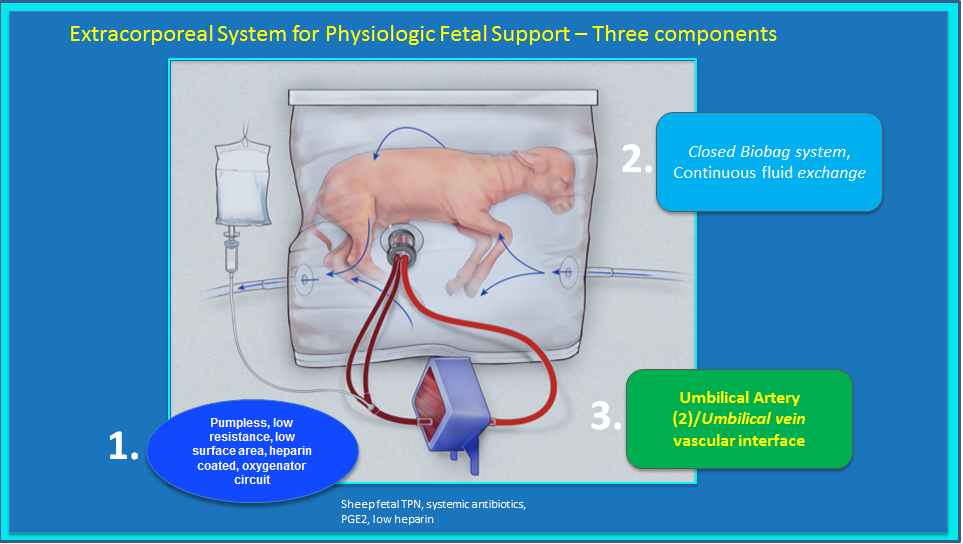
Scientists have created an artificial uterus that could support the development and growth of extremely premature babies. The researchers tested the device on lambs for four weeks and several of the animals developed and grew, with one now more than a year old. The study marks the longest time any external uterine system has been shown to provide a stable environment for any animal, and scientists hope their findings could translate into human use.
The team from the Children's Hospital of Philadelphia mimicked a womb environment by placing premature lambs in a polyethylene film bag hooked up to an oxygen circuit. Experiments showed the organs of the lambs in the artificial wombs were "developmentally equivalent" to those that underwent normal gestation.
Should the team be able to build on their findings, their research could be used to develop chambers filled with amniotic fluid to treat extremely premature human babies.
Complications from premature births are the leading cause of death in children under the age of five, according to the World Health Organization. An estimated 15 million babies worldwide are born prematurely every year and, in 2015, preterm births accounted for one million deaths.
In the U.S., the standard treatment for premature babies is incubation and monitoring. However, researchers wanted to create a system that could offer a better alternative for these newborns. Emily Partridge, one of the authors of the study, worked with critically premature babies and started researching methods to recreate conditions of the womb artificially.
Partridge and her colleagues created a device that incorporates a pump-less oxygen circuit connected to the fetus through an artificial umbilical cord. This system is maintained "within a closed 'amniotic fluid' circuit that closely reproduces the environment of the womb," the researchers wrote in the journal Nature Communications.
The lambs placed into the device were biologically equivalent to a human infant born at 23-24 weeks. Scientists kept the lambs in the artificial wombs for up to four weeks and monitored their progress throughout. On many fronts, progress was positive. "Lambs on support maintain stable haemodynamics, have normal blood gas and oxygenation parameters and maintain patency of the fetal circulation. With appropriate nutritional support, lambs on the system demonstrate normal somatic growth, lung maturation and brain growth and myelination," they wrote. Prior to this study, similar devices had only been able to keep test subjects alive for a few days, while fetal development has never been reported before.
In a press conference, study author Alan Flake said: "Our goal was to achieve 21 to 28 days on the system. After that we delivered the lambs, we put them on ventilators to assess their lung function [and] found they functioned very well and were similar to age-matched normal lambs. At that point, in the interest in learning everything we could, they were humanely euthanized and underwent analysis of brain and other organ development."
He added they have had "lamb survivors" that seem healthy. "They appear to have normal development in all respects once they are taken off the ventilator," he says. "We bottle fed them and grew them up. They are normal in every respect that we can tell. There's no intelligence test for lambs but we think they're pretty smart."
Questions still remain after the study, however. The subsequent data on the development of the lambs was not available, so longer-term effects are not known. Also, the device would need to be scaled-down and adapted if it were to be used for human infants. However, the researchers are confident that over the next 10 years, they will be successful in developing the device for clinical use.
"It's unrealistic that you could apply this system to 100 percent of extreme premature deliveries," Flake said. "One of the current limitations is that the baby would have to be delivered through cesarean delivery, so off placental support and onto the device. Approximately 60 percent of premature deliveries in the U.S. are by cesarean section. This could be expanded, but I would anticipate with the realities that exist, that maybe 50 percent or so could actually be treated with this system." He adds the device could offer a "new standard of care" for extremely premature infants that is "far superior" to what hospitals currently offer.
Colin Duncan, a professor of reproductive medicine and science at the University of Edinburgh, U.K, and not involved in the study, said it marks a "very important step forward" in the treatment of premature babies. "This research isn't about replacing the womb in the first half of pregnancy. It is about the development of new ways of treating extremely premature babies," he said in a statement.
"This is a really attractive concept… [But] there are still huge challenges to refine the technique, to make good results more consistent and eventually to compare outcomes with current neonatal intensive care strategies. This will require is a lot of additional preclinical research and development and this treatment will not enter the clinic anytime soon," he said.
Uncommon Knowledge
Newsweek is committed to challenging conventional wisdom and finding connections in the search for common ground.
Newsweek is committed to challenging conventional wisdom and finding connections in the search for common ground.
About the writer
Hannah Osborne is Nesweek's Science Editor, based in London, UK. Hannah joined Newsweek in 2017 from IBTimes UK. She is ... Read more
To read how Newsweek uses AI as a newsroom tool, Click here.








